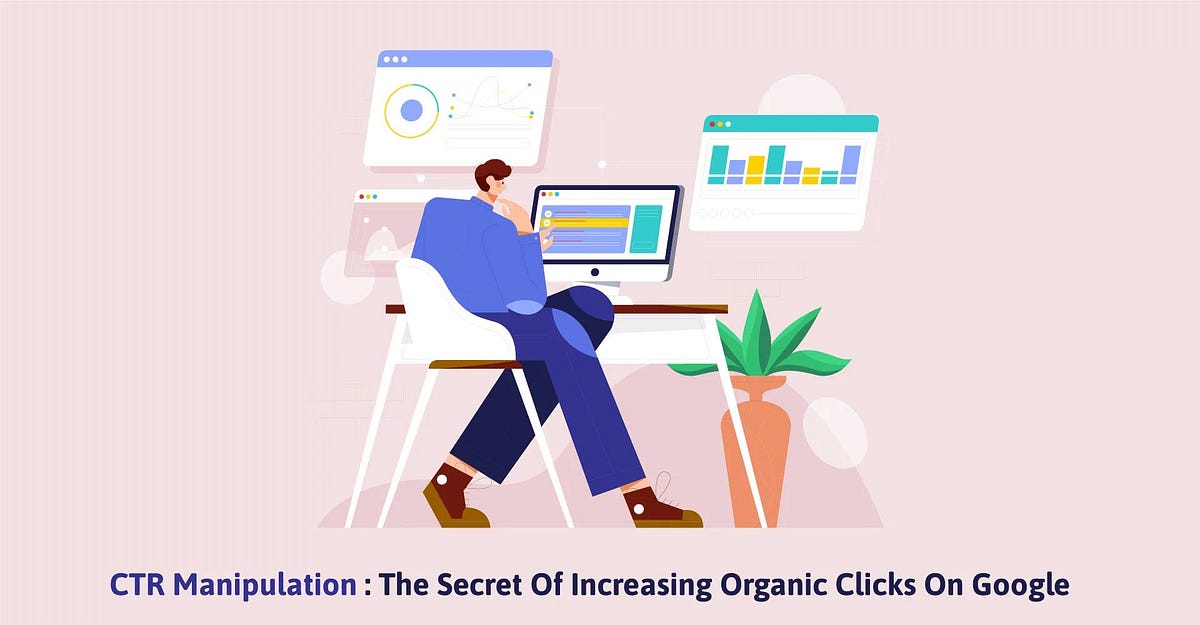Specialist CTR Manipulation Service: Improve Your Online Presence
Wiki Article
Discovering the Relationship Between CTR Control Providers and User Behavior
In the realm of electronic advertising and marketing, the influence of click-through rate (CTR) adjustment solutions on individual habits continues to be a facility and intriguing topic. As online systems increasingly rely upon CTR metrics to determine the success of content, items, and services, comprehending just how these adjusted prices impact user engagement and decision-making processes is vital. The interaction in between CTR manipulation and individual actions questions about authenticity, trustworthiness, and the honest effects of such methods. By dissecting the detailed relationship in between CTR adjustment services and individual actions, intriguing insights emerge that may improve our understanding of electronic advertising techniques and their effects on consumers.Impact of CTR Manipulation on Behavior
Evaluating the influence of Click-Through Price (CTR) manipulation on individual behavior reveals essential understandings right into the characteristics of online engagement. CTR manipulation involves unnaturally inflating the variety of clicks on a particular web link or advertisement to deceive users and search engines. This method can bring about an altered assumption of a webpage's popularity or relevance, ultimately impacting customer behavior.
Additionally, CTR control can skew the information utilized by formulas to individualize user experiences. This can result in individuals being served material that does not line up with their preferences or passions, ultimately resulting in a decrease in customer satisfaction and engagement. Understanding the impact of CTR control on user behavior is necessary for preserving transparency and count on on-line communications.
Individual Engagement With Manipulated CTR
Customer involvement with adjusted CTR data often leads to skewed understandings of on the internet material popularity and relevance. When individuals engage with web content based on unnaturally filled with air Click-Through Rates (CTR), they might think that certain details, items, or services are much more preferred or trustworthy than they actually are. This can cause customers choosing based upon deceptive information, resulting in potentially undesirable outcomes.Engagement metrics like likes, shares, comments, and time invested in a page are typically affected by CTR control. Individuals may be more likely to involve with material that appears to have greater engagement prices, even more perpetuating the cycle of skewed perceptions. As an outcome, web content creators and marketers might focus on creating web content that generates high CTR instead than concentrating on creating truly useful and pertinent material.

Emotional Results of CTR Adjustment

In addition, the emotional effects of CTR manipulation can also show up in transformed decision-making procedures. Users might be more likely to click on web content only based upon its viewed appeal, instead than its actual value or relevance to their requirements. This behavior change can lead to a surface engagement with on-line web content, where individuals may ignore top quality but much less prominent offerings for those with unnaturally boosted CTRs.
Essentially, the mental ramifications of CTR control highlight the relevance of maintaining transparency and authenticity in online communications to promote authentic individual engagement and depend on.
Moral Considerations in CTR Control
Thinking about the moral effects of adjusting click-through prices (CTR) in on-line platforms is crucial for keeping honesty and trust fund within the electronic ecosystem. CTR control elevates issues concerning deceiving customers, distorting data analytics, and jeopardizing the credibility of on-line material. One major honest factor to consider is the prospective effect on individual freedom and decision-making. By artificially inflating CTR, users may be misdirected right into clicking on web links or advertisements they ctr manipulation press release would certainly not have actually picked or else, resulting in an insincere online experience. Additionally, CTR manipulation can skew the efficiency metrics that services depend on to make critical choices, inevitably affecting market competition and consumer trust fund.Another moral element to consider is the justness of adjusting CTR to acquire an unfair benefit over rivals. Involving in such methods not only breaches principles of reasonable play but also weakens the depend on that users position in on-line systems. It is vital for organizations and digital online marketers to promote ethical requirements in their methods to ensure transparency, reliability, and lasting sustainability in the on-line atmosphere.
Implications for Digital Advertising
CTR control can lead to skewed information analytics, deceiving online marketers right into thinking that their campaigns are doing far better than they actually are. When individuals recognize that CTRs have been manipulated, it can erode trust in the brand name, leading to long-term unfavorable consequences for client commitment and brand name credibility.In addition, the use of CTR adjustment solutions can develop an unfair competitive landscape, where business that take part in such methods gain an artificial advantage over those that stick to honest advertising criteria. This can stifle advancement and creative thinking in electronic advertising, as success ends up being more concerning adjustment strategies than delivering real worth to customers. Eventually, the ramifications of CTR manipulation for digital advertising prolong beyond temporary gains, impacting the overall sustainability and credibility of advertising and marketing efforts in the electronic world.
Verdict
In conclusion, the relationship in between CTR control services and user actions is intricate and multifaceted. The effect of CTR control on behavior, user interaction with adjusted CTR, mental results, ethical factors to consider, and effects for digital advertising and marketing all contribute fit this partnership. Comprehending these characteristics is critical for marketing professionals and researchers alike in order to browse the moral ramifications and take full advantage of the performance of their electronic advertising and marketing techniques.Report this wiki page